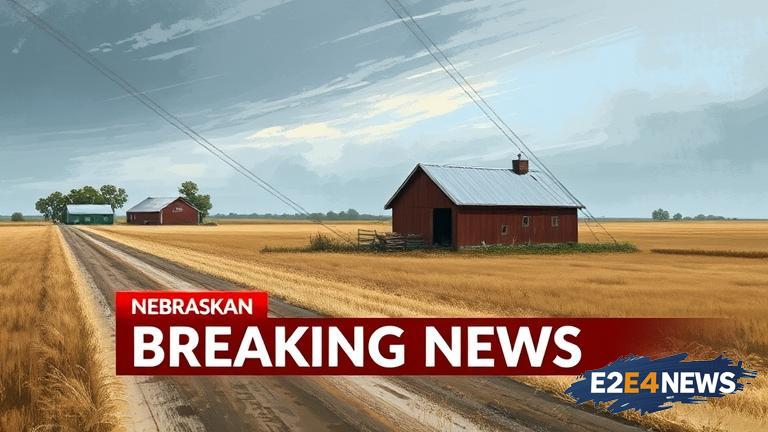Nebraska, known for its rich agricultural land and farming industry, is currently facing a crisis due to severe weather conditions. The state has experienced a combination of droughts and floods, which have had a devastating impact on farmers and their livelihoods. The droughts have resulted in significant crop damage, with many farmers reporting losses of up to 50% of their crops. On the other hand, the floods have caused widespread damage to farms, homes, and infrastructure, leaving many farmers without access to basic necessities like food and water. The situation is further complicated by the fact that many farmers in Nebraska are still recovering from the aftermath of the 2019 floods, which caused an estimated $1 billion in damages. The current weather conditions have also had a significant impact on the state’s livestock industry, with many farmers reporting losses of cattle and other animals due to the harsh weather conditions. The Nebraska Department of Agriculture has reported that the state’s cattle population has declined by over 10% in the past year, with many farmers struggling to keep their animals alive. The severe weather conditions have also had a significant impact on the state’s economy, with the agricultural industry being one of the largest contributors to the state’s GDP. The Nebraska Farm Bureau has estimated that the severe weather conditions could result in losses of up to $1.5 billion for the state’s agricultural industry. The situation is being closely monitored by state and federal officials, with many calling for emergency aid to be provided to affected farmers. The USDA has announced plans to provide emergency loans to farmers affected by the severe weather conditions, but many are calling for more to be done to support the state’s agricultural industry. The Nebraska state government has also announced plans to provide aid to affected farmers, including low-interest loans and other forms of assistance. Despite these efforts, many farmers in Nebraska are still struggling to cope with the aftermath of the severe weather conditions. The situation is a stark reminder of the importance of supporting the state’s agricultural industry, which is not only vital to the state’s economy but also to the nation’s food supply. The severe weather conditions have also had a significant impact on the state’s rural communities, with many residents struggling to access basic necessities like food and water. The situation is being closely monitored by local officials, with many calling for emergency aid to be provided to affected communities. The American Red Cross has announced plans to provide aid to affected communities, including food, water, and shelter. The situation in Nebraska is a stark reminder of the importance of being prepared for severe weather conditions, which can have a devastating impact on communities and industries. The state’s agricultural industry is not only vital to the state’s economy but also to the nation’s food supply, and it is essential that support is provided to affected farmers. The severe weather conditions have also had a significant impact on the state’s environment, with many areas experiencing significant soil erosion and water pollution. The situation is being closely monitored by state and federal officials, with many calling for emergency aid to be provided to affected areas. The Nebraska Department of Environmental Quality has announced plans to provide aid to affected areas, including funding for soil conservation and water quality improvement projects. The situation in Nebraska is a stark reminder of the importance of protecting the state’s environment, which is not only vital to the state’s economy but also to the nation’s ecosystem. The severe weather conditions have also had a significant impact on the state’s infrastructure, with many roads and bridges being damaged or destroyed. The situation is being closely monitored by state and federal officials, with many calling for emergency aid to be provided to affected areas. The Nebraska Department of Transportation has announced plans to provide aid to affected areas, including funding for road and bridge repair projects.





